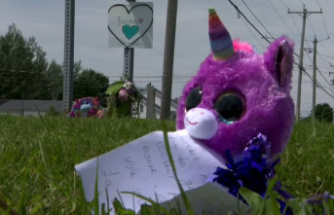The delegates of SPD country Party in Saxony-Anhalt have spoken out against a renewed grand coalition in Confederation. At meeting in Wernigerode, a joint application by Jusos and five working groups of party received a narrow majority. The vote is not binding. One day after conclusion of exploratory talks by SPD, CDU and CSU in Berlin, however, it means a bitter damper for SPD leader Martin Schulz. Demands were also made out of or SPD country associations, result of probing repair.
In case of four abstentions, decision was adopted with 52 votes to 51. It literally says: "The SPD Saxony-Anhalt speaks out against a renewed grand coalition, especially taking into account first results of probing with CDU and CSU."
Prior to vote, Foreign minister and former SPD leader Sigmar Gabriel, as guest speaker of party Congress, had vainly promoted opening of coalition negotiations with union. The exploratory paper is a "very good result", said Gabriel, but he also said that even more should be brought out in event of possible coalition negotiations. Overall, he was optimistic that federal Party congress would vote for coalition negotiations in one week: "I have no doubt now."
Or members of SPD leadership advertised strongly for approval of party base in a week. The Rhineland-Palatinate Prime Minister Malu Dreyer said that sometimes "special purpose communities can do quite a good job". Her colleague from Mecklenburg-Vorpommern, Manuela Schwesig, said in NDR, citizens expected that a government would finally come into being.
Scepticism also in Hesse and BerlinJuso boss Kevin Kühnert, who also spoke as a guest at National Party congress in Wernigerode, repeated his No to a new grand coalition. The party must honestly assess what has been achieved in probing and what is not, he said. It would also be necessary to take into account experience of cooperation with Union so far. As an example, Kühnert called right of return from part-time fulltime, which was already in last coalition agreement, but was not implemented. "These are not negotiation successes, but debts union towards SPD," says Kühnert.
Berlin's governing Mayor Michael Müller (SPD) told Tagesspiegel that he sees a recirculation of grand coalition "very critical". "There was a clear vote of votes to both coalition partners. The same coalition with same policy is not an adequate answer to that. This is why I am not convinced of a continuation without decisive changes, "said President-in-Office of Federal Council of newspaper. He did not, refore, choose to "short or long".
On Friday, however, Berliner was still "cautiously optimistic" about probing. The will to renew and change is recognizable in result paper, Müller said according to RBB. In vote on board of SPD, Miller, he also voted for coalition negotiations.
It was known from Hesse that SPD National association re also penetrates results. The provincial party commissioned provincial board to make clear, by mid-coming week, exactly where to rework.
Finally, on 21 January, Social Democrats want to decide on opening of coalition negotiations with CDU and CSU on a nationwide party day in Bonn. In or federal states, especially under party-left, rejection was also loud. Kühnert announced that it would promote a rejection of exploratory results on a "no-Groko-tour" of individual national associations.
Date Of Update: 14 January 2018, 12:02









